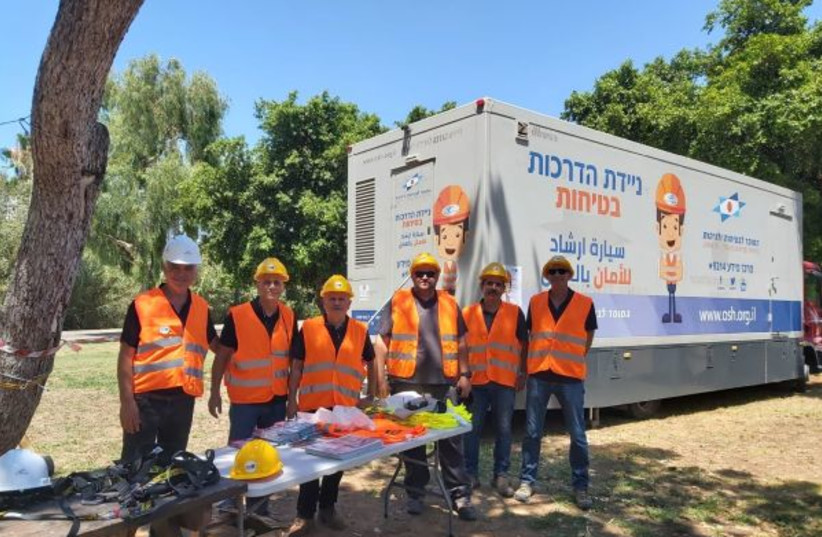The Israel Institute for Occupational Safety and Health (IIOSH) is constantly interested in protecting workers from harm. This time they paid attention to Muslim Israelis facing the Ramadan month of daily fasting and Israeli women working night shifts.
About 21% of Israeli Muslim Arab men are in the working-age group. Due to the halt of the entry of Palestinian workers into Israel during the war in Gaza and battles in the North, the burden on workers in this sector has increased even more. They may experience dehydration, chronic fatigue, and an increased risk of accidents due to fasting.
The IIOSH presents safety guidelines for Arab workers during Ramadan with which every employer must be familiar.
About 100,000 Arabs do construction work, of whom about 65,000 are Israeli Arabs and the rest are Palestinians employed in a variety of jobs. Work accidents claim the lives of dozens of Arab and Jewish workers every year and also cause many injuries. Among Muslim workers, the risk increases during Ramadan.
The dangers increase and the likelihood of an accident rises when the worker is not focused, tired, hungry, and thirsty, so those who fast during Ramadan should take extra care.

Another factor increasing the risk among Arab workers in Israel is the economic pressure experienced by the Arab sector since the beginning of the war. According to the strategy and planning department of the Ministry of Labor and Social Affairs, the rate of young men who are not in employment, education, or training in the Arab population stood at 33.6% in December, more than a third. The figure among young Arabs ages 18 to 24 is 50% higher than the rate of young Arabs not in employment, education, or training on average from January to September, before the war, which was only 22.2%.
These are IIOSH’s recommendations:
During Ramadan, physical work that may lead the worker to extreme exhaustion and fatigue should be avoided. If he is committed to performing the work, he should break the fast and continue it another day. If the worker takes medication regularly, consultation with the treating physician is necessary.
During fasting, work hours should be carefully planned to significantly reduce exposure to the sun. The highest exposure occurs between 10 a.m. and 4 p.m., so a solution is to perform outdoor work in the early morning and late afternoon hours and concentrate work during the noon hours in shaded or covered areas.
As usual, before sunrise, the worker should eat a healthy and nutritious breakfast, mainly consisting of carbohydrates. Eating fatty foods may cause this.
Workers should sleep continuously for at least six hours. Lack of sleep harms the worker’s health and increases the risk of work accidents. Avoid resting in dangerous places on construction sites.
Workers should avoid exposure to dust that can cause respiratory dryness and must use personal protective equipment.
Labor and Social Affairs Minister Yoav Ben-Tzur said that with the beginning of Ramadan, “I call upon employers to respect Muslim citizens fasting during these days and ensure their safety at work. At this time, I extend my blessings to the Muslim citizens of Israel with the greeting of Ramadan Kareem and an easy fast. May the events of the Ramadan month bring with them a true opportunity for shared life, mutual respect, tolerance, brotherhood, and goodwill.”
IIOSH director-general Dr. Miki Winkler invited employers to consult with the institute’s guides to ensure the safety of Muslim workers.
Meanwhile, IIOSH said that the main dangers faced by women working night shifts are heart disease, diabetes, fatigue, breast cancer, mental health issues, and decreased concentration that can lead to errors and workplace accidents. Nearly half of such women suffer from sleep difficulties compared to 26.3% of men; 46.3% of women experience very high fatigue levels compared to 32% of men. In honor of International Women’s Day last week, IIOSH explained how to protect the health of female workers during night shifts.
Night-shift workers such as those in hospitals sleep five to seven hours less per week than those working day shifts, and their sleep is generally shorter and of lower quality. The combination of sleep deprivation and demands for work during “biologically low” hours can undermine the body’s physiological stability.
A new IIOSH study of 1,498 summer employees examined the physical and mental effects on Israelis. The survey was conducted during the summer months of 2023 and during the war in early December. The research findings clearly show that women experience higher fatigue, anxiety, and sleep difficulties compared to men.
Among women with children under the age of 18, gender gaps are even greater. A total of 46.8% of working mothers experience sleep difficulties compared to 24.1% of fathers, and 48.7% of working mothers experience very high fatigue at work compared to 32% of fathers.
The consequences of fatigue are particularly evident in two types of work functions – repetitive tasks without high cognitive demands lasting half an hour or more, and complex tasks requiring concentration or thought. Women who work night shifts while also managing household finances and family life and caring for young children may feel more exhausted and at higher risk of health problems.
